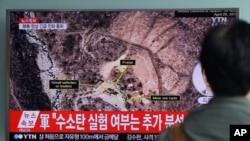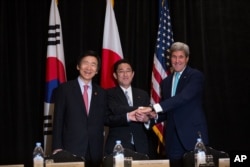Nine days after North Korea’s latest nuclear test, U.S. Secretary of State John Kerry Sunday expressed a continued willingness to try to revive dialogue with Pyongyang if it freezes its atomic weapons and ballistic weapons development programs.
“Serious negotiation about the future” could occur if Pyongyang does not “engage in any more provocative actions,” Kerry told his Japanese and South Korean counterparts.
A multi-national forum intended to denuclearize the Korean peninsula was set up in 2003, but the parties (both Koreas, China, Japan, Russia and the United States) have not met since December 2008, when talks stalled over verification issues.
Sunday’s three-way meeting followed North Korea’s fifth underground nuclear test and an increased pace of regular missile firings – “the latest reckless choices Kim Jong Un has made,” Kerry said.
Analysts, reviewing open source satellite imagery, say the impoverished country may have completed preparations for three more nuclear tests that could occur at any time.
South Korea’s foreign minister, Yun Byung-se, appeared in no mood Sunday to consider negotiations with his country’s arch-rival, in view of Pyongyang’s repeated defiance of U.N. Security Council resolutions and sanctions.
Yun called for the current U.N. General Assembly to “send out a united and forceful message,” and impose even more robust sanctions on North Korea as it is “now at the final stage of nuclear weaponization.”
Yun warned that Pyongyang’s weapons are a “looming perfect storm that may not only pounce on Northeast Asia but sweep over the entire world,”
and said South Korea, the United States and Japan need to put a full stop and permanently roll back North Korea’s nuclear programs by “whatever means we have.”
Japan’s foreign minister, Fumio Kishida, also called on stronger pressure to be applied on Pyongyang through the U.N. Security Council “including further sanctions, as well as taking our measures respectively.”
Kishida, hosting the Sunday meeting, also said in light of the threat from North Korea now being “totally different in dimension,” the international community “is required to initiate a different response accordingly.” However, he gave no specifics while reporters were allowed in the room for the opening remarks.
A joint statement issued by the three countries following their meeting also revealed no specifics. It noted the ministers “explored ways to work together to ensure that all countries fully and effectively implement all their obligations and commitments under U.N. Security Council 2270, which imposed the strongest sanctions ever placed upon North Korea.”
Broadcasts from Pyongyang and commentaries carried in the state-run press in recent weeks have warned Washington and Seoul that if they take any military action threatening North Korea’s survival, it would “immediately fire” its nuclear warheads.






